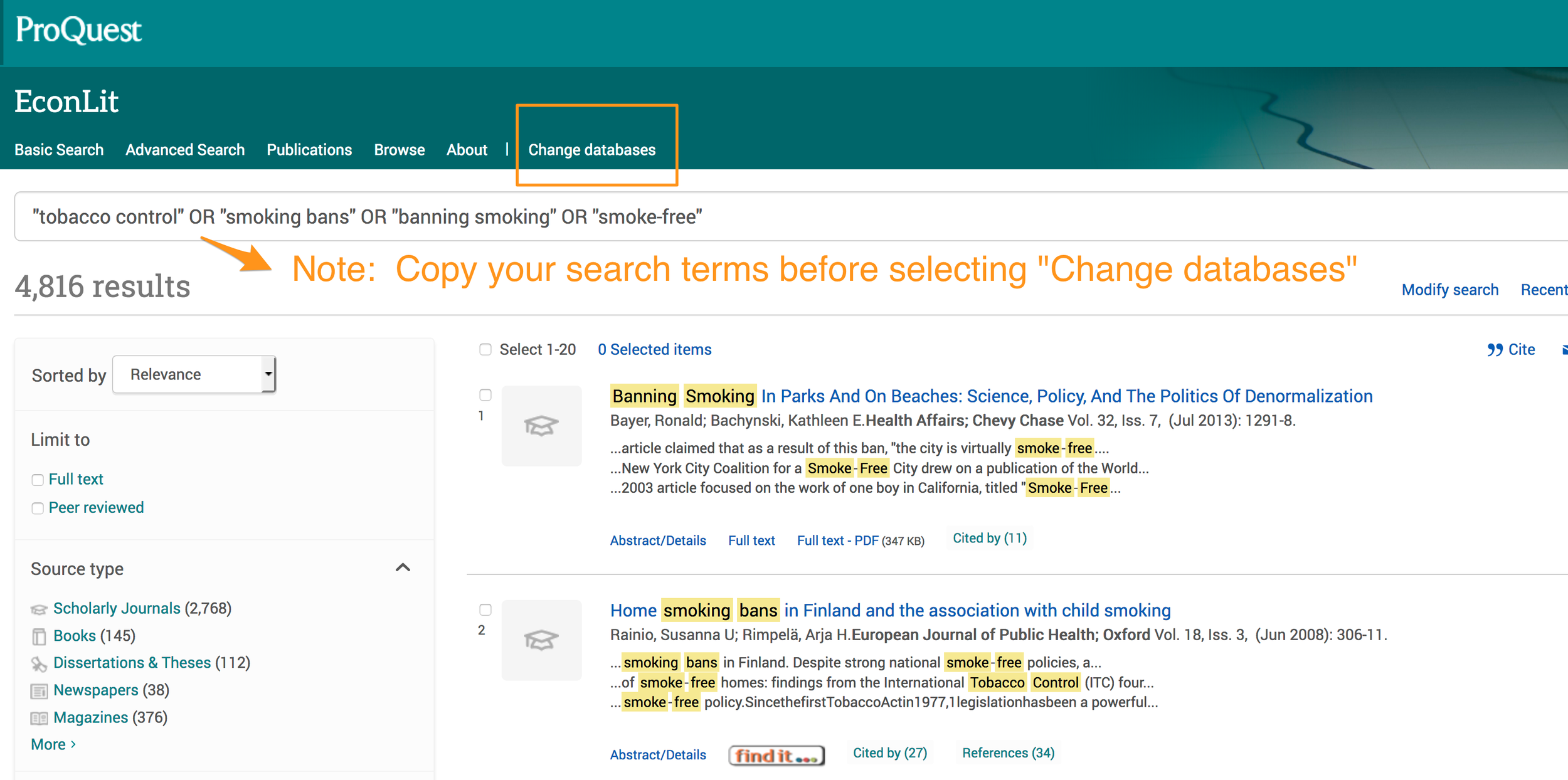Health Economics Research Workshop
Simon Elichko / selichk1@swarthmore.edu
Social Sciences & Data Librarian
Presentation on health disparities and socioeconomic determinants of health
Find research (articles, books)
Find data (empirical evidence)
Read, evaluate, discuss, plan, present
Potential pitfalls
Cherry picking
Directionless Tab Overload
Low quality and reliability
1. Focus on actively filtering, rather than passively searching
3. Organize your findings as you go
Successful Research Practices
2. Start with quality data sources
1. Focus on actively filtering, rather than
passively searching
• Choose research tools that offer you more control
• Use search filters to adjust your results
• Search clearly
Choose research tools that offer you more control



Google + Google Scholar --> wide net, but few filters
EconLit --> Results focused on scholarly research,
Filter + sort results by multiple criteria
FindPolicy: Public Policy --> Search limited to major think
tank websites
Choose research tools that offer you more control
Compare Google Scholar + EconLit
1. Go to Google Scholar and search for: long-term care
How many search results come up?
Which academic disciplines do you see represented?
What options do you have to narrow down your results?
How are your results sorted? (Can you change the order?)
2. Open a new tab. Go to EconLit and repeat the search.
(keep EconLit open)
How to Filter Results in EconLit
Geography: Focus on research about a specific country
Filter by Subject > Select country name
Publication Date
Publication Title (the journal an article was published in)
How to Filter by Geography
>> Start with: EconLit search for long-term care <<
Scroll down to Subject. Select More.
Find u.s. in the list. Check the box to Include. Click Apply.
How to find articles about complex topics
Two approaches:
- Topic Groups (expands your results)
- Subject Searching (helps focus your results)
Search Clearly
How to find articles about complex topics
("long-term care" OR "nursing home" OR "assisted living")
(medicaid OR "private insurance")
AND
--> What this means: To appear in your search results, an article needs to include at least one term from each group.
1. Search Using Topic Groups
"long-term care" --> 1,154 results
"long-term care" OR "nursing home" --> 1,481 results
"long-term care" OR "nursing home" OR "assisted living" --> 1,571 results
How to find articles about complex topics
disabled ---> 1,277 results
disab* ---> 4,137 results
(disab* OR handicap*) -----> 14,617 results
Another example:
Subject filters help you prioritize articles that relate to a specific aspect of your topic
How to find articles about complex topics
2. Subject Searching
Some useful subject filters for this class:
- Economics of the Elderly, Economics of the Handicapped, Non-labor Market Discrimination (J14)
- Economics of Minorities, Races, Indigenous Peoples, and Immigrants, Non-labor Discrimination (J15)
- Economics of Gender, Non-labor Discrimination (J16)
Expand your search to include more policy journals

Starting in EconLit, select Change Databases.
Scroll down to Social Sciences, select box for Politics, click Apply.
Another research tool: FindPolicy
Searches the websites of major think tanks
Useful for finding policy analysis, reports, etc.
More selective than a general Google search
FindPolicy https://www.findpolicy.org/policy
- Choose "Public Policy"
- Google search tricks work on this site:
keyword after:2020 ---> results updated after 2020
"exact phrase" ----> results include this exact phrase
Start with quality data sources
Where to find recommendations:
Library Research Guides
• Health Economics Data Guide
• Economics Guide > Data
Asking professors + librarians
Organize your findings as you go
Annotate while saving sources (identify themes)
Be consistent: save everything the same way



Make sure you're saving permanent links
Consider a visual note-taking strategy (e.g. mind-mapping)
Focus on actively filtering, rather than
passively searching
• Choose research tools that offer you more control ✓
• Search clearly ✓
Organize your findings as you go
• Annotate while saving sources (identify themes) ✓
• Be consistent: save everything the same way ✓
• Make sure you're saving permanent links ✓
• Consider a visual note-taking strategy ✓
Start with quality data sources
• Library research guides, asking faculty ✓
Get help with research:
Simon Elichko
Social Sciences & Data Librarian
• Schedule an online appointment
• Email: selichk1@swarthmore.edu
For quick library questions, try the Chat button in Tripod. (e.g. get help finding a particular book or PDF of an article, library hours, etc.)
Describe your policy issue in no more than 5 words
List some other words that you would expect to come up in discussions about your topic. (Imagine explaining your interest in this topic to your professor - what words would you use?)
Geographic keywords can help focus your results - try regions and countries, but also states, provinces, cities.
How to Choose Keywords / Search Terms
Remove conjunctions, articles and prepositions
Then, search Google Scholar, EconLit, or Tripod.
Browse the search results for terminology (synonyms, other words that relate to your topic)
Econ 75: Health Economics
By Swarthmore Reference
Econ 75: Health Economics
How to use EconLit to find relevant research in Economics
- 1,056



